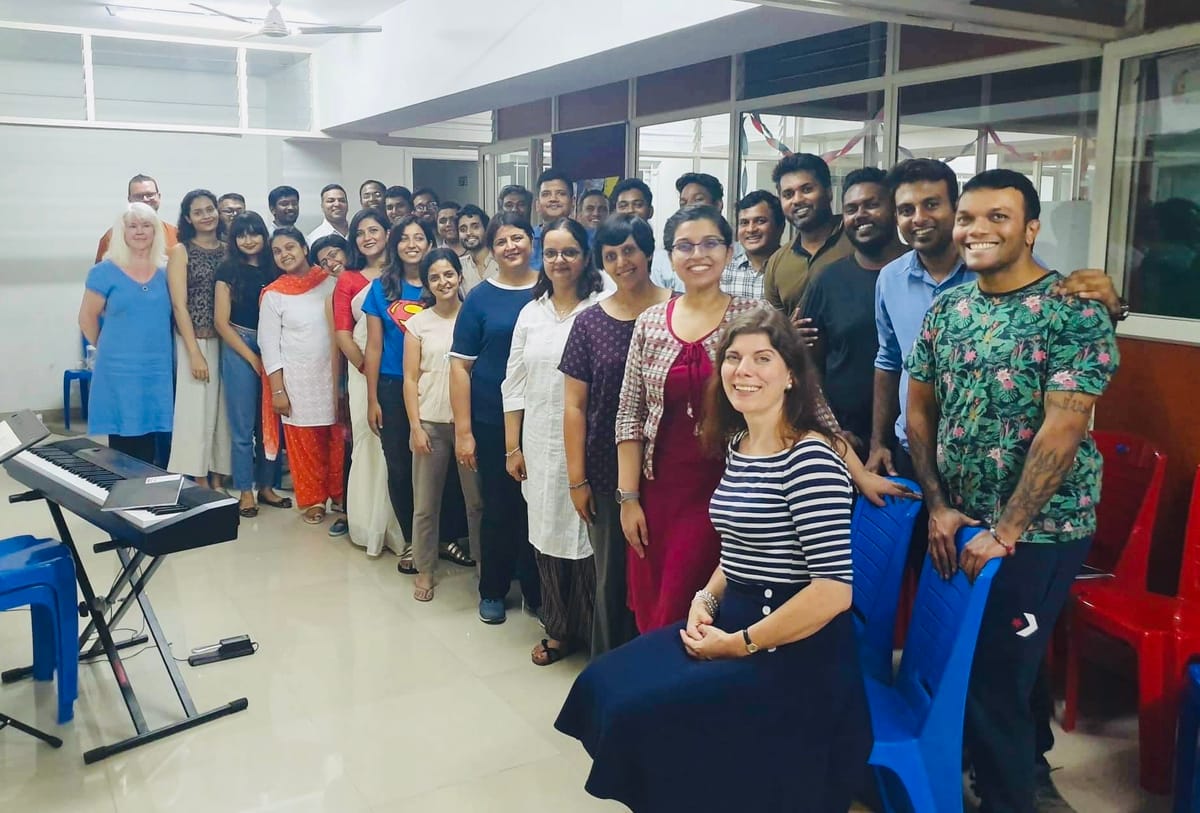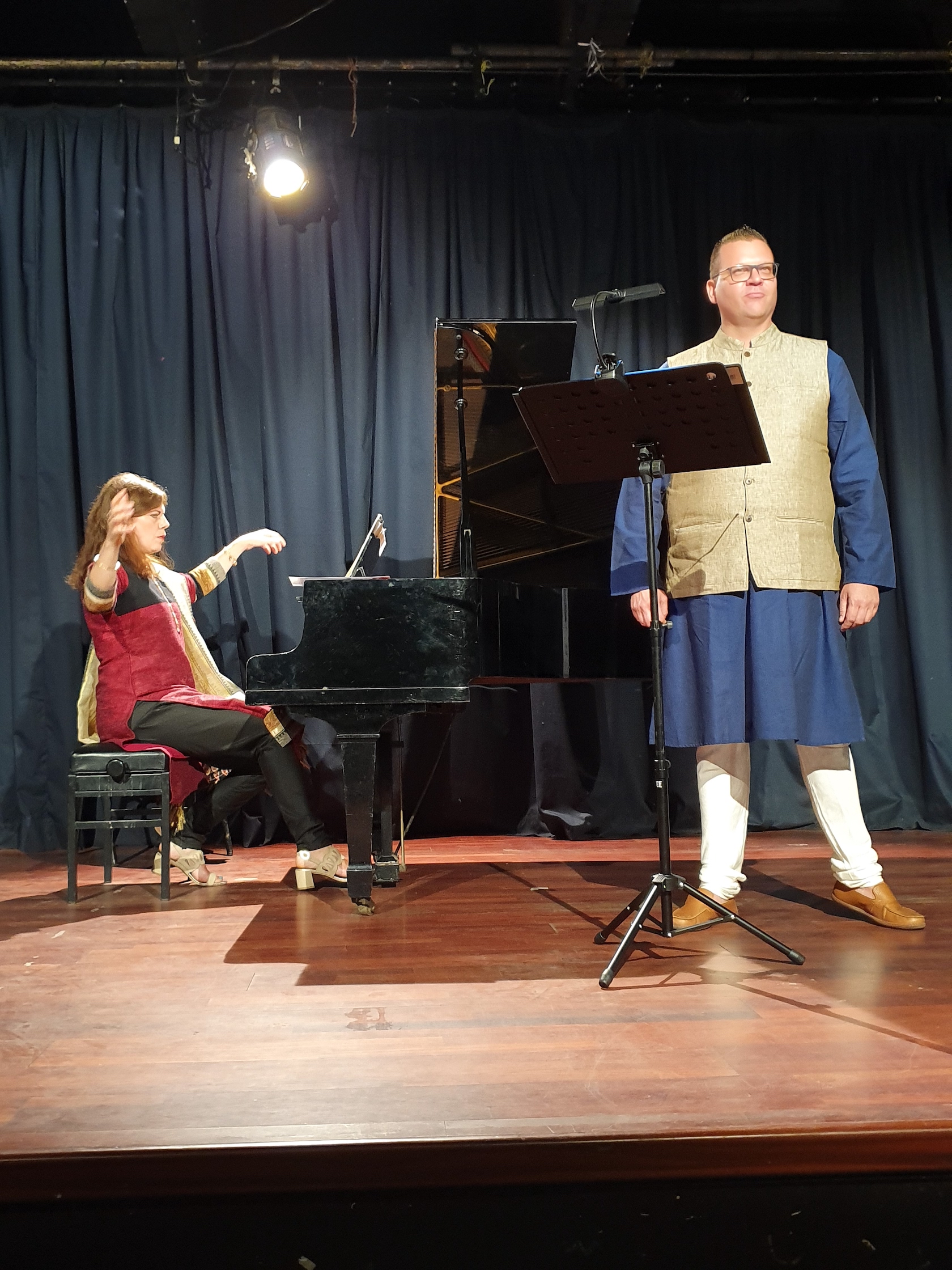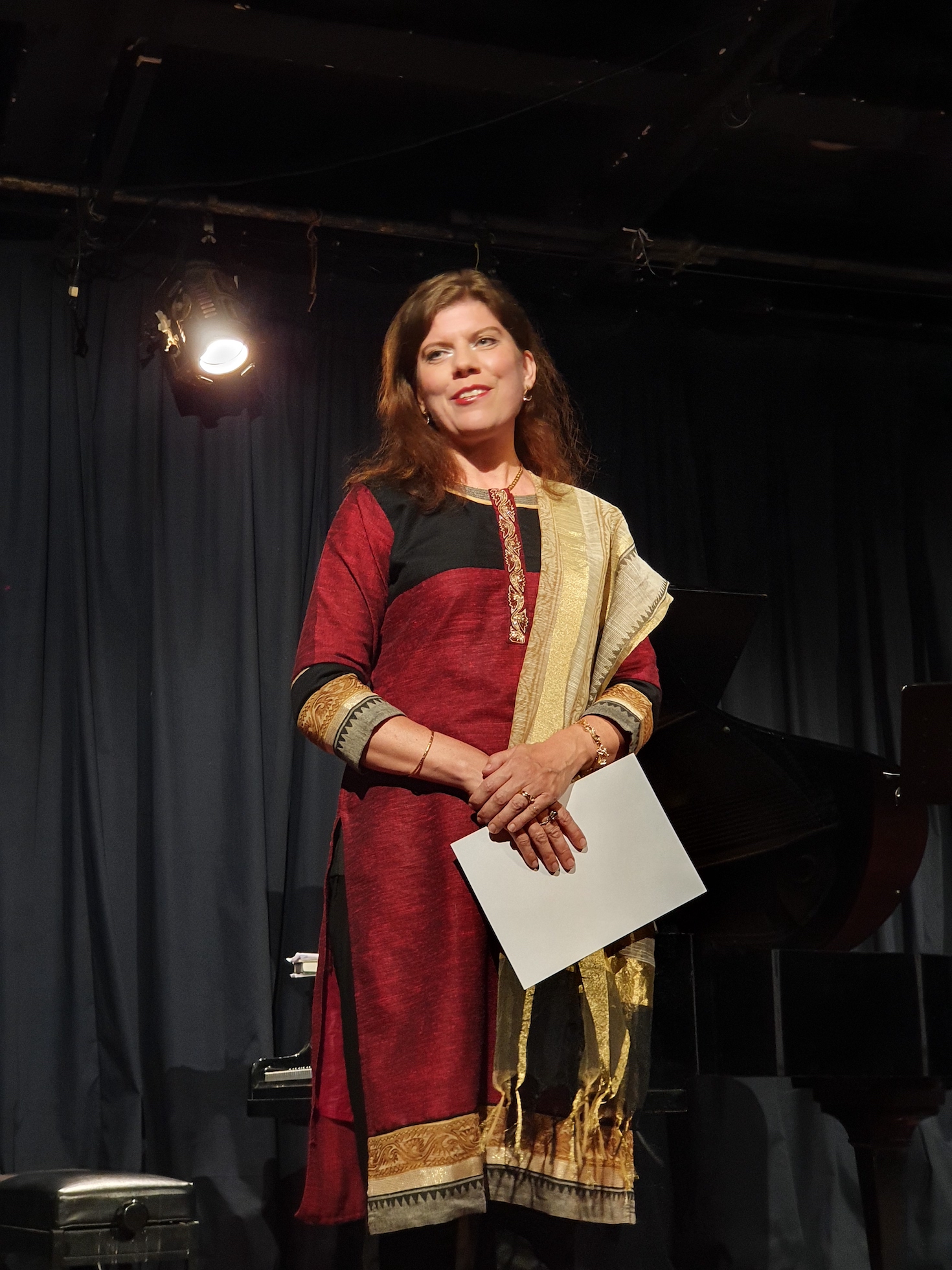From Accompanist to Collaborative Pianist

This text was quickly sketched before an evening seminar, “The Collaborative Pianist” at The Bangalore School of Music, 18th June during the festival “Voices of Bangalore”. Apart from my own experiences as a singer and vocal coach, the text is based on the brilliant book by Martin Katz, “The Complete Collaborator”, OUP 2009. I also drew many wisdoms from the article “I am not an Accompanist” in “Metronome Online”, Fall 2017 by Robert Thies and “The Revenge of the Collaborative Pianist” by Brian Wise, published on the Steinway.com website: all fun and highly recommended reading! This written text was then the basis of the seminar, improvised upon and accompanied (in this case, yes!) with sung and played excerpts from art songs, the music being projected on a screen on stage.
The last chord from the piano and the last spinning minim of the song has echoed out from stage. The audience is on its toes in silence, just waiting for letting the venue explode with roaring applause. Everybody’s eyes are on the glittering soloist, who shared the Wonders of Life with us, the Eternal Truths, the Mysteries, the Drama. There! Applause! Applause!
Soloist takes her bow, receiving endless admiration, basking in the adulation of her fans. The Moment of Glory! The Glamour! (My new DRESS!!!) My increased number of Facebook LIKES! Because I AM A CLASSICAL SINGER. Time for champagne, dinner and more admiration for such an artist as Me – MySelf – I …!
The Accompanist
In the meantime, some two meters away, another hardworking artist stands up at the grand piano by himself, only to find his mum and little sister back in the audience waving shyly but enthusiastically to him. He’s The Accompanist, who paved the way for our dear singer. How?
- He coached her two months before the concert with language, pronunciation, style and ornamentation
- He gently prompted all the first lines in her fifth and seventh songs, because she wasn’t prepared enough, but more concerned with her dress and creating a Fb concert event than memorizing text
- When she had a memory lapse in the fourth song by Brahms, without realizing it herself, and skipped sixteen bars between bar 15 and 31 – the bars are quite similar, only modulating differently – he helped her out, seamlessly covering up her error
Hopefully, in this very concert, nobody really understood German anyway, thus nobody realized that the story she tried to tell in fact got quite absurd, lacking sixteen bars of very, very important information about who was in love with whom and above all, who was to blame for someone’s death, if somebody died, at all. Perhaps nobody died? The singer hadn’t understood the text, either. Who was Brahms, by the way? Well, whatever! I’m a singer!)
So, who was the real artist in this case? Well, friends in music: time has come for us singers to upgrade our dear partner in music – the collaborative pianist! No more do we talk of just “Accompanist”. The terminology has changed quickly, and the word “accompanist” is more or less wiped out at all major institutions. More than a hundred music colleges and conservatories worldwide now offer programs instead at a “collaborative pianist faculty”. We prefer much more to talk about what the game is really about: we are co-workers, co-laborative. Either do we no longer talk about accompaniment, but we say “piano part”; we talk about “who are you working with?” and “who plays with you” rather than “who’s accompanying you”. Words are important and create reality. Time has indeed come for an upgrade.
It’s slightly demeaning to be referred to as the person who is just expected to lurk in the shadow, toiling at the low end underlining the “Great Soloist”.

It still happened in the 1940’s-50’s that the pianist and the grand piano were concealed behind the velvet curtain on stage, the singer appearing in front. Modern, equal music making is about partnership. “Who’s your partner” is a much nicer way of referring to the most important partner you have in music, if you are a singer.
I remember watching a master class with my own pianist partner since many years, a well-renowned collaborative pianist in Sweden, holding three different chairs as a professor of collaborative piano and vocal coaching. He was now sitting at the grand piano, having been given a number of some badly printed out, wrinkled photocopies from an ignorant student, trying to arrange these copies in the right order on his music stand, since no page number survived in the careless photocopying process. While helping the young singer out with a task she should have prepared beforehand, she suddenly snapped with her fingers to make him “hurry up so I can start”. In front of the other students, eager to be in command, she wanted to look more important than she was.
The three-fold professor calmly and simply stood up and walked away. We were baffled. (Unfortunately, this student didn’t quite learn from this important lesson, either.)
How have we learnt that we can command a pianist by snapping our fingers and playing the diva? What are the reasons? Truth is, nobody likes a diva, even if we singers love to consider ourselves simply divine when we put on our best dress or tails and dare to step on to the stage. Times have indeed changed.
We never show disrespect to our partners in music, be they pianists or singers or whatever instruments. We are not masters; neither are we servants. We are only servants to Music itself. We need to change the protocol; we need to step up our game for the sake of Music and for the respect of others. Students should learn this from the very first beginning and teachers should treat the students with an equal portion of respect. Kindness and understanding goes a long way!
Advice for singers and instrumentalists of all ages and stages
- Singers and instrumentalists should be taught to arrive in time at the first rehearsal, being fully prepared. There are no excuses. Our own preparation is the gift we give to our teachers, conductors, pianist partners and co-students. To know our own lines – but also to know the pianist’s lines. Where do our lines blend? Where can we make room for each other’s lines? Which part is most important in certain places in the piece? We must do our homework beforehand, if we want to qualify as good musicians.
- Ask the pianist: “what do you need from me?” A most unexpected question, that will take a singer or instrumentalist a very long way. It shows interest, respect and willingness to understand the pianist’s burden. This question shows star quality and humbleness.
- Make sure the pianist is credited in the program the same way as the “soloist” – by the way, this term is also on its way to the pyre. We are mezzos, we are tenors, we’re flutists, we’re cellists and we’re pianists, not “soloists”. We work and walk together on stage.
- A shy and somewhat insecure pianist partner – maybe a co-student or a teacher finding him- or herself in this new situation of playing chamber music or art songs with piano, should be encouraged to lift the lid of the grand piano completely. Very often this doesn’t raise the volume but increases the clarity of tone. Balance is often much better out in the hall than it is perceived by the singer standing next to the grand piano.
- Never say “my pianist”. He or she is definitely not someone you own. “My partner” is always preferable. (There was a time when we said “my slave”. Those days are GONE.)
- After the piece is over, greet the pianist with a handshake or a hug and take the bow together onstage. You shared a musical moment together; you should care to acknowledge it together.
Advice for the pianist in a collaborative environment
- Have a clear idea about the music being rehearsed and bring them on! You are not a servant of a soloist, you’re a co-musician and a partner.
- Ask your partner if there is any place where she or he might need more time to breathe. Ask him or her if she could use more space dynamically in certain phrases. (A nicer way of saying “SING LOUDER!”)
- Have some self-respect. Don’t accept engagements that compromises you professionally, where you are not credited, but forgot and disrespected. We do not thrive among people who don’t care but are self-consumed.
- Encourage and partake in any pre-concert lecture. Audiences love learning about the music and will enjoy the performance much much more. Pre-concert lectures can involve talking, showing projected pictures, showing excerpts of the score, musical excerpts played.
We need to understand that teachers pass on only what they/we have learnt ourselves. As students, we therefore need to understand and show kindness to teachers and coaches. They might have been working for years in schools and institutions where management hasn’t showed understanding or proper support for their teachers. Even a good teacher can be worn out by circumstances that their students know nothing about. A good student finds something to learn from every teacher or coach. Showing kindness and gratitude for this is uplifting. It certainly doesn’t make things worse in a situation where there is not much choice of teachers.
We all need to continue learning, in order to be even better versions of ourselves, be we teachers, coaches, collaborative pianists or students. Today with the internet, offers and possibilities of learning are indeed endless. We can read, we can listen, we can watch seminars and masterclasses in videos. We can talk to each other about we’re seeing in these; we can create our own music circles together where improvement as our focal point. There is no excuse. “If you do not want to become better, you’ll soon cease to be good.”






